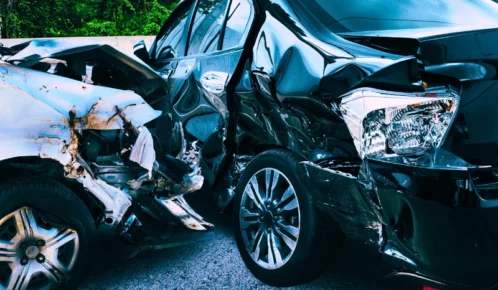You may be entitled to financial compensation if the truck driver was operating under the influence of drugs or alcohol during a crash that left you with serious injuries. Liability will rest on the truck driver for choosing to drive while impaired and eventually contributing to an accident. Liability may also spread to the trucking company if it failed to do thorough background checks or conduct regular drug or alcohol tests.
Table of Contents

You could also hold a bar or restaurant liable if it over-served a truck operator who eventually caused an accident that harmed you. You need a truck accident lawyer on your side for a better outcome. A seasoned lawyer will know how to tackle trucking regulations, deal with insurance companies, and prepare for trial if necessary.
Were you injured in a truck accident involving an impaired driver? Call our Illinois truck accident lawyers at Ankin Law at 312-600-0000 for a free consultation and case evaluation.
The Impact of Drug and Alcohol Use on Truck Drivers
Alcohol and drugs weaken the skills a truck driver needs to operate a commercial motor vehicle safely. Driving under the influence (DUI) of drugs or alcohol can raise the risk of accidents, injuries, and fatalities. In fact, vehicle accidents involving alcohol caused 254 fatalities in Illinois in 2020.
Alcohol and drugs can impact a truck driver in the following ways:
- Impaired Vision: Alcohol and drugs can distort a truck driver’s vision, weaken the driver’s ability to fix his or her eyes on the road, and result in double vision. Impaired drivers often misjudge distance, speed, and the motion of other motor vehicles. It’s not uncommon for such drivers to move across the centerline, weave within and between lanes, or even drive off the road.
- Weakened Motor Skills and Coordination: Alcohol and drugs can weaken a driver’s motor abilities and coordination. The driver may struggle to steer, brake, and control the truck.
- Drowsiness or Fatigue: Some drugs trigger sedation or drowsiness in users. Such drugs can cause a driver to operate a truck while fatigued or drowsy. Fatigued driving is one of the leading causes of vehicle accident fatalities on U.S. roadways. A recent study by the AAA Foundation for Traffic Safety found that drowsy driving caused 17.6% of all fatal accidents between 2017 and 2021.
- Poor Decision-Making: Alcohol and some drugs can weaken a driver’s decision-making abilities. This may result in decisions that endanger other road users, such as reckless driving, failing to give the right of way, and not stopping at red lights.
- Impaired Color Distinction: Most roadway information, including road markings, traffic signals, and signs, is conveyed to drivers in a wide range of colors. Drivers impaired by drugs, alcohol, and other intoxicants have a reduced ability to differentiate colors. This impairment increases their risk of making costly blunders and causing serious accidents.
- Slow Reaction Time: Alcohol, controlled substances, and even prescription medications can impair a truck driver’s reaction time. Simply put, the impaired driver takes quite a while to recognize a dangerous situation and respond appropriately. Reduced reaction time makes road collisions more likely to happen.
Engaging in distracting activities like texting and making phone calls is another driving behavior that can slow reaction and increase the risk of accidents. That is why the leading causes of truck accidents swing between drunk and distracted driving.
What Are the Legal Consequences for Truck Drivers Operating Under the Influence?
The laws on alcohol and drug use are stricter for truck drivers compared to their counterparts who operate passenger vehicles. This is because of the massive size and force of impact that makes truck accidents more severe than passenger car crashes. The maximum blood alcohol concentration (BAC) for truck drivers in Illinois is 0.04%, while that of regular car drivers is 0.08%.
A driver who exceeds the Illinois truck driver alcohol limit can face severe legal consequences. The driver may be charged with DUI in a criminal court. The BAC level, previous DUI convictions, and aggravating circumstances will determine the severity of the DUI charges.
A DUI conviction may result in fines, incarceration, and commercial driver’s license (CDL) suspension or revocation. Probation, community service, and compulsory alcohol or drug treatment programs are some other legal consequences of a DUI conviction.
On top of criminal charges, the truck driver may be held legally liable for the accident in a civil court. The accident victim may seek compensation for medical bills, lost wages or income, property damage, and non-economic damages by bringing a personal injury lawsuit against the truck driver. Also, a personal representative of the deceased victim’s estate can sue for wrongful death caused by a DUI crash.
Steps to Take After an Accident With an Impaired Truck Driver
Taking appropriate steps immediately after an accident in which the truck driver was operating under the influence of drugs or alcohol can positively impact your physical and financial recovery.
Pull Over in a Safe Place and Check for Injuries
Start by pulling over in a safe location immediately after the crash. Ensure you are near the crash scene. Inspect yourself for injuries. Confirm whether others involved in the crash have been injured. If possible, move those with visible injuries to a safe place and provide first aid.
Call 911
Call 911 to report the truck accident to the police. Let the call operator know that you or others involved have been injured and require urgent medical help. The police will come to the crash scene to conduct investigations, document relevant evidence, and prepare an accident report. The emergency medical team will treat you and others injured in the crash.
Document the Scene
Take high-quality pictures and videos of the accident location. Your visual evidence should include details like vehicles involved, road layout, road conditions, skid marks, and nearby security or traffic cameras.
Be sure to document your injuries through pictures and videos. Visual proof of your injuries captured moments after a crash can help reveal the nature and extent of your injuries.
Record Crucial Witness Information
Identify people who may have seen the events leading up to the accident and the accident itself. Politely ask them if they can provide an account of the accident. If they accept, request for their names and phone numbers.
Don’t skip this step, even if you see the police interviewing witnesses. The police may talk to only a few witnesses or fail to incorporate witness statements or details in the report.
Exchange Information With the Truck Driver
Illinois law mandates motorists involved in an accident that results in injuries or property damage to stop at the scene and exchange information. However, it is common for truck drivers to leave the accident scene if they are under the influence of drugs or alcohol. Escaping the accident scene after a crash that leads to bodily injuries or property damage is considered a hit-and-run.
If the truck driver remains at the scene, obtain his or her name, contact details, insurance information, and license plate information. Also, get the name, phone number, and email address of the trucking company.
Seek Medical Treatment
Get medical assistance immediately after leaving the crash scene. You may visit an emergency room (ER) if you did not receive treatment at the scene. You may also see your doctor if he or she is available for an emergency appointment.
Visit a medical facility for a checkup, even if you feel well. The shock triggered by an accident can sometimes delay the onset of pain and other symptoms of the injuries suffered. Additionally, seeking medical treatment enables documentation of your injuries. This documentation can support your claim for damages in an accident where the truck driver was operating under the influence of drugs or alcohol.
Seek Legal Help
You can seek legal support any time after getting injured in a truck accident. The earlier you let a lawyer handle your case, the higher your odds of success.
A lawyer who has built a flourishing practice around truck accidents can make it much easier for you to recover your rightful compensation. The lawyer can explain your legal rights and options to help you make informed decisions regarding your case. He or she can also investigate specific circumstances of the crash and assemble evidence to prove liability.
Your lawyer can work closely with experts like accident reconstructionists, doctors, financial planners, and trucking industry professionals to prepare convincing expert witness testimony. The lawyer can also determine the worth of your truck accident case to ensure insurance companies do not mislead you into taking low settlements. The seasoned legal team at Ankin Law can handle the whole legal process and ensure you receive sufficient compensation after an accident involving an impaired truck driver. Contact us to arrange a free case review with one of our truck accident lawyers.



